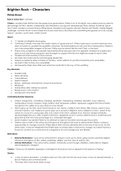Brighton Rock – Characters
Pinkie Brown
Role in Crime Text – Criminal
Crimes – murders Hale (further than the gang have gone before, Pinkie Is out of his depth, was carried away by need to
get revenge for Kite’s death), manipulates and threatens a young and venerable girl, Rose, betrays his friends, Spicer
and Cubitt, murders a second time by killing Spicer, threatens and assaults old men, Brewer and Prewitt, marries illegally
underage, commits the sin of sex outside the church and tries to trick Rose into committing the gravest sin of all, suicide.
Typical – poverty, youth male, violent, brutal
About
• 17, leader of a Brighton race gang,
• Conflicted Catholic who sees the world in terms of ‘good and evil’. Pinkie continues to commit mortal sins and
does not seem to consider the possibility of heaven; he simply believes in hell, and this is reinforced by Greene's
use of recurring hellish imagery of the sea. Pinkie may be almost like the Anti-Christ, or the devil.
• Warms ever so slightly to the equally impoverished Rose because she is his opposite: whereas he is jaded and
bent on evil, she is kind and good, and he begins to suspect that the two might be made for each other.
• Troubled and has aversion to love and sex
• His male role model was the criminal gang leader Kite
• Greene consistently refers to Pinkie as "the Boy," which reflects his youthful immaturity and vulnerability
• He doesn’t like to show any vulnerability
• He frequently thinks about Kite and wishes he could talk to him e.g. at the wedding
Key Moments
• Murders Hale
• Date with Rose
• Carves Brewer
• Meets Colleoni
• Races – betrayed, shocked him, shows his innocence
• Kills Spicer
• Marries Rose after visiting her parents
• Breaks down in the cinema
• Suicide pact and death
Contrasting Reader Response
• Violent, misogynistic, controlling, unfeeling, apathetic, threatening, heartless, deceitful, cruel, violence,
manipulative, brutal, cohesive, angry hateful, short-tempered, sadistic, repressed, suggests that his humanity
has died in him, selfish as he uses others to save himself
• Had to grow up too fast, never had innocence, lost, alone, unable to trust others, little choice, used to have
innocent dreams, can’t believe in good, grew up in poverty in Brighton slums, bullied at school – learnt to be
violent to survive at a young age, Kite ‘put a razor in his hand’, referred to as ‘the boy’ broken family life,
abused/neglected as a child, unable to feel love, desperate to be in control, believes God is vindictive/cruel,
groomed by Kite who took advantage of a vulnerable teenager
• Some readers may admire Pinkie for his attempt to improve his station and escape his poverty
• Greene uses a motif of "the stirrup and the ground" throughout the book to demonstrate Pinkie's numerous
opportunities to change; however, Pinkie rejects them all and ultimately dies at the end of the novel. On the
other hand, it may be interpreted that Pinkie does not simply reject chances for change, but rather that he is
forced to continue as a criminal as he is trapped by his own background and lifestyle
Motivations
• External Motivations – Lack of law enforcement, trying to cover up his crime, gang culture, parental neglect,
influence and legacy of kite, useless underlings, religion, poverty, lack of options, Ida,
• Internal Motivations – Fear (of poverty), Sadism, immaturity, power hungry, rebellion, malevolence, religion,
sexual repression, misogyny
Camus – “Every act of rebellion expresses a nostalgia for innocence and an appeal to the essence of being.”
Quotes
• ‘a boy of about seventeen…a shabby smart suit, the cloth too thin for much wear, a face of starved intensity, a
kind of hideous and unnatural pride’
• ‘The eyes which had never been young’





